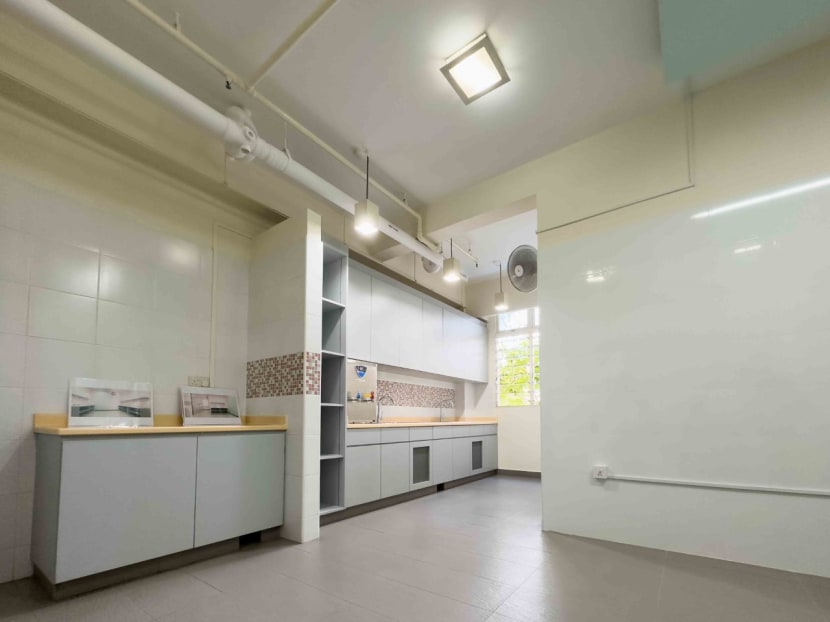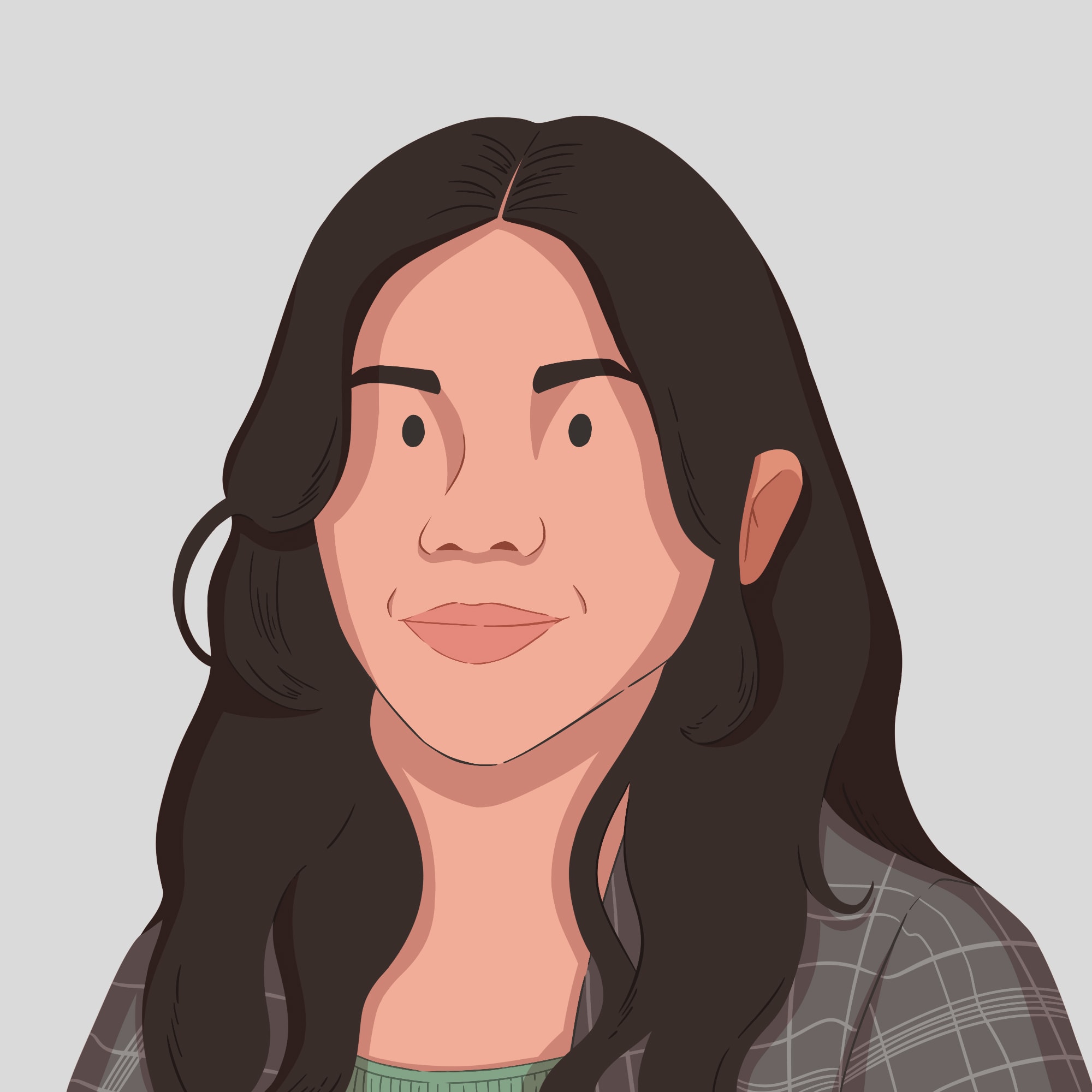Gendered floors, CCTV cameras among suggestions from welfare groups for HDB pilot letting low-income singles rent rooms
SINGAPORE — Welfare organisations have brushed aside online critics who have likened the ambience at a public housing pilot programme allowing singles to rent their own room while sharing facilities to "a prison cell".

Planned kitchen space for the Single Room Shared Facilities at the former Anderson Junior College hostel.
- Volunteer welfare organisations have welcomed the public rental pilot to provide low-income singles with a bedroom to rent with shared facilities
- They said that the new Single Room Shared Facilities initiative helps provide more people with a roof over their head while granting them more privacy
- While they noted that shared facilities may be a source of conflict, they said that ensuring that the initiative's operator builds a close-knit community among tenants would be key to preventing it
- They also made various suggestions, such as enhancing security to create a safe space
SINGAPORE — Welfare organisations have brushed aside online critics who have likened the ambience at a public housing pilot programme allowing singles to rent their own room while sharing facilities to "a prison cell".
They have told TODAY that the aesthetics of a room are not nearly as important as providing accommodation to low-income singles in need of a safe place to stay.
Four volunteer welfare organisations that run shelters and work closely with low-income singles said that operators of the pilot, under the Housing and Development Board (HDB), will need to create a community and set ground rules to ensure that tenants behave amicably with each other.
Aside from that, they had various suggestions for the Single Room Shared Facilities initiative, including having gendered floors and installing closed-circuit television (CCTV) in common areas to better ensure safety.
Ms Junie Foo, president of Singapore Council of Women’s Organisations, said: "If you are in need of housing, having a reasonably comfortable space that you can call your own can be a major step forward."
She said that with the key objectives of affordability, security and privacy in mind, the scheme gives tenants the basic necessities to provide for themselves independently, with some support from the community and social service agency.
Mr Derek Lim, volunteer head and outreach coordinator of volunteer welfare organisation Homeless Hearts of Singapore, added that the additional privacy is “a step in the right direction”.
This is especially so for homeless persons who may have no family support and want to avoid the risk of conflict if they stay with a stranger in a public rental flat.
On Monday (March 13), HDB announced its latest pilot allowing low-income singles to rent a 9sqm bedroom equipped with basic furnishings such as a bed frame, wardrobe, table, wall shelves and a small refrigerator.
Each floor of the former Anderson Junior College hostel — which is being repurposed for the pilot — will house 24 singles who will have access to two shared restrooms comprising several toilet and shower cubicles, as well as a dining room and kitchen with five cooking stoves.
This initiative would grant greater privacy to tenants while providing companionship and support, said HDB.
This is unlike the Government's Joint Singles Scheme Operator Run pilot, where a social service agency matches singles with a suitable flatmate and manages flat-sharing arrangements.
Under the latest initiative, an operator will maintain the site and provide activities at a common facility room, among other functions. More details about the new pilot, including the rental costs, will be announced later, HDB said.
ENSURE TENANT FITS INDIVIDUAL LIVING, SUITS OTHER NEIGHBOURS
For Mr Firdaus Abdul Hamid, co-founder of volunteer welfare organisation The Kampung Bridge, the initiative would provide a much-needed refuge for some of his organisation’s beneficiaries who sleep rough.
“It’s about survival more than comfort sometimes. If you have a roof over your head, it's one less problem,” he said.
“It’s about survival more than comfort sometimes. If you have a roof over your head, it's one less problem.Mr Firdaus Abdul Hamid, co-founder of volunteer welfare organisation The Kampung Bridge”
Nonetheless, he hopes that additional thought would be put to reduce conflict between neighbours on the same floor.
“It’s important to know the profile (of the people staying) and group them together to reduce the chances of conflict from the start,” said Mr Firdaus.
“If they have any serious mental health issues and may need stronger support, they may not suit this new initiative of having their own space. So these are some things we need to be cautious about to ensure they are safe.”
Ms Foo added that to enhance security, especially for women, security cameras should be installed in all common corridors, stairwells and lifts.
“Gendered floors would be a good idea since the showers and toilets are communal. It can also be beneficial for women who feel safer among women because of past trauma and women who don the hijab,” she said.
Ms Foo cautioned that the initiative’s communal kitchen could cause some tension due to dietary or culinary preferences and varying standards of cleanliness.
To address such concerns, a social service agency should support tenants in accommodating their differences and resolving disputes amicably.
BUILDING A COMMUNITY
Ms Lee Yean Wun, executive director of Kampong Kapoor Community Services, said: ”A living space is different from a home. This current project is adapted from an existing hostel hence there are existing limits to the size, facilities and structure.
“The community of the people who live there needs to be built so that it becomes more of a home than a space.”
“The community of the people who live there needs to be built so that it becomes more of a home than a space.Ms Lee Yean Wun, executive director of Kampong Kapoor Community Services”
While having a private bedroom might mean that tenants have the option to retreat to their own personal space, shared facilities may be a potential cause of conflict, noted Ms Lee.
“Hence the operator needs to help set good enough ground rules, mitigate and build positive and functional relationships among the people,” she said.
Ms Lee added that it would be ideal to group six to eight tenants together to allow them to bond closely, similar to the way this happens in a university dorm.
Mr Firdaus suggests that the operator ensure activities held in premises meet their needs and are welcoming enough to make them feel “like it is home”.
This could be by giving them the independence to visit communal socialising areas and have facilities there for them to use when they want, similar to what his organisation provides for low-income persons.
BIGGER ROOMS, FLEXIBLE CRITERIA TO HELP MORE
While all four organisations noted that this is a pilot programme being run at a temporary site, they are hopeful it would take off and be expanded across the country with added tweaks to serve more people in the community.
Ms Lee hopes that HDB can expand the scheme to those who may not meet the criteria for “singles”. This includes those who may have their names tied up in homes that they cannot return to, or those who are separated but not divorced.
Mr Lim also hopes that HDB would increase the monthly income ceiling — which is currently S$1,500 — to stay in a rental flat so as to account for inflation.
“We know of some beneficiaries who exceed the income ceiling by a few hundred, but may struggle to afford other housing arrangements aside from public rental units. They’re stuck in between because they need to get their footing,” he said.
He noted that HDB has been flexible with this ceiling on a case-by-case basis.
Mr Lim is also hopeful that this pilot would be expanded. And should that time come, he wishes that the rooms could be bigger to accommodate persons with disabilities.
“If they are wheelchair-bound, it can be difficult to move around in such a small room,” he noted.
Ultimately, Ms Foo said that future tenants of this initiative should provide feedback to the relevant authority so as to further improve the concept.
“With the accessibility to security, privacy and affordability, and the added component of compromise and support from the community and the social service agency, we hope that HDB’s pilot of the Single Room Shared Facilities scheme will help provide low-income singles with the housing security they deserve.”











